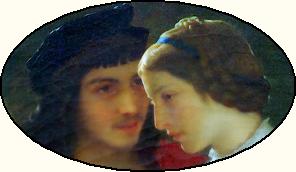Spadina Literary Review — edition 5 page 14
.../
Did Albert feel guilt? Oliver certainly wished him to. Closing out the “Albert and Flora” sequence, he lays this tongue-lashing on Albert in absentia:
Come hither, wretch, and see what thou hast done,
Behold the heart thou hast so falsely won,
Behold it, wounded, broken, crushed and riven,
By thy unmanly arts to ruin driven;
Hear Flora calling on thy much loved name,
Which, e'en in madness, she forbears to blame.
Not all thy sighs and tears can now restore
One hour of pleasure that she knew before;
Not all thy prayers can now remove the pain,
That floats and revels o'er her maddened brain.
Albert has already fled the scene, so who exactly is the recipient of these lashes? Well, who is sitting there watching those vehement words make stripes across the page, who is sitting there hearing those words snap in his mind? Who but Oliver himself?
Let it be revealed: Albert and Flora = Oliver and Lady X.

Words were spoke beneath the bower
(Wm. Bouguereau, 1872)
After nearly two centuries, I doubt whether anyone can identify who exactly among Oliver’s acquaintances was Lady X. But the question we originally asked was, Why on earth did Oliver place “Albert and Flora,” at the heart of “The Rising Village”? Actually, the question should be reversed: why did Oliver wrap “The Rising Village” around “Albert and Flora”?
It was because of a dream he had. He dreamed he visited the nine Muses in a heavenly Temple of Fame to seek their help, for:
The pity my case, I’m at best a poor Poet,
Yet I wish not that every town critic should know it.”
The Muses screamed in fright when he opened his mouth to speak, that’s how graceless he was. But the god Apollo intervened and ordered them to cook up a career plan for Oliver, so they advised him to produce heroic poetry for the Empire. That was his level of competence, he could be a hero with a pen.
Oliver followed their advice. That would win accolades from the garrison crowd, at least. But Oliver still managed to preserve his core interest. Just as he maintained an undercover personal life within his lifetime service to the great impersonal imperial entity, so he kept “Albert and Flora” as his private and not necessarily honorable personal space within the Happy Acadia bumph his social circle wanted to see.